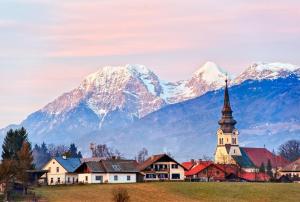find your perfect postgrad program
Search our Database of 30,000 Courses
Studying a Postgraduate Program in Austria
Find courses in AUSTRIAPLEASE NOTE: As a result of Brexit, from Autumn 2021 postgraduate students from the European Union studying at a UK university will be charged the same tuition fees as international students. Meanwhile, UK students studying their postgraduate course at a European university are also likely to incur higher tuition fees than their EU counterparts. It is advisable to check with the individual universities in the UK and Europe for up-to-date information on tuition fees for all postgraduate programs.
Austria: an overview
 From skiing in Innsbruck to dancing in Vienna, historical Austria offers rich and vibrant opportunities to postgraduate students interested in studying in the birthplace of Wolfgang Amadeus Mozart, Franz Kafka and Sigmund Freud. Located in western Europe, Austria is completely landlocked, sharing borders with Germany, the Czech Republic, Hungary, Slovakia, Italy, Slovenia, Switzerland and Liechtenstein. Austria is known for its beautiful architecture and blend of German, Slavic and even Italian cultural influences. Its official language is German, but as the home of popular tourist destinations like Vienna and Innsbruck, many languages including Turkish, Croatian and Hungarian are also spoken. Austria is well known for the accomplishments of its famous citizens including Franz Liszt and Johann Strauss. Vienna, it’s largest city, is arguably also its most famous, and has long been a centre of arts and culture in Europe with a reputation dating back to the 16th century. The currency in Austria is the Euro.
From skiing in Innsbruck to dancing in Vienna, historical Austria offers rich and vibrant opportunities to postgraduate students interested in studying in the birthplace of Wolfgang Amadeus Mozart, Franz Kafka and Sigmund Freud. Located in western Europe, Austria is completely landlocked, sharing borders with Germany, the Czech Republic, Hungary, Slovakia, Italy, Slovenia, Switzerland and Liechtenstein. Austria is known for its beautiful architecture and blend of German, Slavic and even Italian cultural influences. Its official language is German, but as the home of popular tourist destinations like Vienna and Innsbruck, many languages including Turkish, Croatian and Hungarian are also spoken. Austria is well known for the accomplishments of its famous citizens including Franz Liszt and Johann Strauss. Vienna, it’s largest city, is arguably also its most famous, and has long been a centre of arts and culture in Europe with a reputation dating back to the 16th century. The currency in Austria is the Euro.
Austria: Austrian universities and education
Austria has three differnt types of university, federal universities (Universitäten), private universities (Privatuniversitäten) and universities of applied science (Fachhochschulen).
The country’s rich educational history began with its largest and oldest university, the University of Vienna. Founded in 1365, this university boasts 85,000 students and a combined 123 postgraduate programs of study. Located at the heart of Vienna, the university is nicknamed “hauptuni” or ‘main uni’.
The University of Innsbruck is another highly regarded Austrian university was founded in 1669, and has an excellent reputation as a research university. It is located in Innsbruck, Austria’s second city and two-time host to the winter Olympic games. Innsbruck Medical School is part of this university, and the medical tradition at Innsbruck dates back to before the founding of the university.
The main language of instruction in Austria is German, although both the University of Vienna, and the University of Innsbruck offer a selection of courses taught in English. Not all courses are necessarily available in English however, and you will want to contact the university you’re interested in to make sure that your chosen postgraduate program is available with English instruction.
If you choose to study in German, language courses are available to give a working knowledge of the language, and many courses require that you complete a German language course before beginning your studies.
Austria: university tuition fees and funding
 Universities in Austria fall in to two categories where funding is concerned: State and private institutions. State institutions are funded by the Austrian government, and as such can offer free tuition to students from EU and EEA countries.
Universities in Austria fall in to two categories where funding is concerned: State and private institutions. State institutions are funded by the Austrian government, and as such can offer free tuition to students from EU and EEA countries.
Students from certain non-EU/EEA countries may also qualify for free tuition, but would need to check carefully with their university of choice.
Private universities require that students pay the tuition costs, which can vary between €10,000 and €25,000 per year.
Research grants are available for both German and English courses at Austrian universities in a variety of subjects. Students from Asian countries, and some north African nations may also be eligible for specific research grants based on the country of origin.
Some institutions will also provide their own scholarships for postgraduate students, which are usually available to students from specific nations, courses, or levels of study.
Living as a student In Austria
Austria is a great country for postgraduate students. It is very easy to travel around as Austrian cities are very well connected by public transport. Trains are fast and reliable and exciting cities like Budapest, Prague, Munich and Venice are all accessible by train.
Within Austrian cities, it is not necessary to have a car, as buses and tramlines are also readily available, and cycling is a popular alternative to public transport.
Students in Vienna can purchase a “Semesterticket”, which is a public transport pass valid for one semester to students up to age 27 who are enroled in Viennese universities.
Cost of living
Costs of living will vary in Austria, with prices in the cities in keeping with other large European cities. Many places will offer discounts and sales, including special discounts for students, and you may want to consider budgeting costs to keep from overspending.
Austria’s currency is the Euro, and students from outside the EU will want to take careful note of conversion rates. Currently, one Euro is worth the following:
Euro 1.00 EUR
US Dollar 1.316668
British Pound 0.810936
Indian Rupee 71.574070
Australian Dollar 1.255512
Canadian Dollar 1.299320
Emirati Dirham 4.836253
Swiss Franc 1.210106
Chinese Yuan Renminbi 8.208562
Malaysian Ringgit 3.996875
New Zealand Dollar 1.582714
Austria: student visa and immigration
 EU citizens
EU citizens
Citizens of the EU and EEA may enter and study in Austria without a visa, but they must register with their local magistrate’s office if they wish to stay for more than three months. They must also obtain an attestation of registration.
Non-EU citizens
Non-EU and EEA citizens must apply a Student Permit of Registration, which must be obtained before entering the country. To gain the Student Permit of Registration you will need the following documentation:
1. Proof of identification, for example passport.
2. Proof of financial support. Thos postgraduate students who are under 24 years old and self supported must provide evidence of €412 per month to support themselves during the duration of their studies, while students who are over 24 must be able to afford €747 per month.
3. Proof of admission from the Austrian university.
4. Certificate of good conduct from the police.
Student Residence Permits are only valid for one semester and must be renewed.
Austria: choosing a city to study in
 Thousands of international students study in Austria each year. More than 15% of the country’s total university enrolment is made up of international students. Whether arts, music, science or nature is your preference, you can find just what they’re looking for in Austria’s major cities.
Thousands of international students study in Austria each year. More than 15% of the country’s total university enrolment is made up of international students. Whether arts, music, science or nature is your preference, you can find just what they’re looking for in Austria’s major cities.
Vienna, Austria’s capital and largest city was voted the fifth best student city in the world, only beaten by Paris, London, Boston and Melbourne. Long considered a centre of arts and culture, Vienna is a popular student city, with the largest number of universities, including the nation’s top two institutions. Filled with cafes, beautiful baroque architecture, and the birthplace of some of the most famous classical composers and musicians, the city has much to offer students.
Graz is Austria’s second largest city after Vienna, and it has the biggest reputation as a student town, where 1 in 5 residents is a student. The city boasts a vibrant nightlife that strongly caters to students, and a peaceful, relaxed atmosphere during the day. With six universities in its city limits, the city attracts both home and international students alike.
Innsbruck is one of Austria’s most student-friendly towns, with a buzzing nightlife. There are a variety of things to do in this Austrian city, with a castle (Schloss Ambras Castle), a zoo (Alpenzoo, or Alpine Zoo), and even a ski jump, (Bergisel Ski Jump) to keep you entertained! Also a popular tourist destination, Innsbruck can give students a taste of Austria’s most exciting opportunities, while still giving them plenty of academic inspiration: it’s home to a large and active student population.
Salzburg is a popular city for tourists, but offers a unique experience to students interested in history. Known for the preservation of its historical buildings, Salzburg Old City is a Unesco World Heritage site. Similarly, the imposing Hohensalzburg Fortress and the beautiful Salzburg Cathedral form part of the city’s old world charm.
Lastly, Linz, Austria’s third biggest city located in the Alps, has its own unique identity that is both modern and charmingly traditional. Named the European Capital of Culture in 2009, the city has a quirky, eclectic feel with a strong musical history, and a plethora of museums, and cafés sprinkled among quaint streets and grand old cathedrals.
Austria’s cities vary richly in culture and students can have very different experiences depending on where they choose to study. From traditional hamlets to the busy capital city, there is more than enough to choose from to find the experience that will best suit you.
Apply for a Postgrad Solutions Study Bursary
